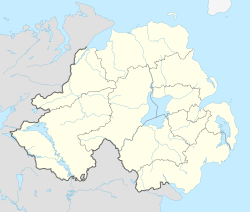Culmore | |||||||
|---|---|---|---|---|---|---|---|
 NIR Class 3000 train passing the site of Culmore station in 2006 | |||||||
| General information | |||||||
| Location | Culmore, County Londonderry Northern Ireland | ||||||
| Coordinates | 55°02′39″N7°15′06″W / 55.0441°N 7.2518°W | ||||||
| Other information | |||||||
| Status | Disused | ||||||
| History | |||||||
| Original company | Londonderry and Coleraine Railway | ||||||
| Post-grouping | Belfast and Northern Counties Railway | ||||||
| Key dates | |||||||
| 1 October 1853 | Station opens | ||||||
| 2 July 1973 | Station closes | ||||||
| |||||||
Culmore railway station served Culmore and Coolkeeragh in County Londonderry in Northern Ireland.

The Londonderry and Coleraine Railway opened the station on 1 October 1853. [1]
It closed on 2 July 1973.

